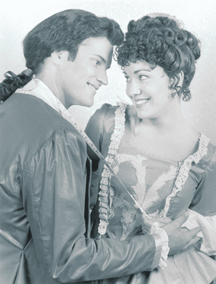

[ Metro | Metroactive Central | Archives]
Supple Couples
Opera San José plays Mozart's marriage game to perfection
By Philip Collins
Mozart's The Marriage of Figaro was consummated joyfully, with nary a hitch, by Opera San José Saturday night, and the reception afterward was a rousing, well-earned standing ovation. Opening-night's cast (which alternates with a second lineup of players throughout the run) honored Mozart's most charming of scores with outstanding singing and characterizations that were ingratiatingly brought to life.
Here's the historical background of The Marriage of Figaro.
Director Daniel Helfgot matches Lorenzo da Ponte's clever libretto with shrewdness. From his multiethnic casting--which hilariously compounds the story's famous intrigues--to the numerous nuances thrown in along the way, it is a production that bristles and beguiles.
Mel Ulrich anchored the opening-night production with a performance that vaulted nimbly between levity and seriousness. His Figaro was a real person--roguish, prone to mischief, but not so much that emotional moments are lost. Through Act I, Ulrich resisted embellishments and played the role straightforward, with no winks and such. But once the scheming against Count Almaviva began, Figaro's playful streak took off with genuine zeal.
Ulrich's rich baritone voice unlocked a wealth of shadings from Figaro's nature. His emotional focus accented Figaro's good-natured motives rather than self-absorption. When chiding Cheribino of his impending military commission, in the aria, "Non più andrai" (From now on), Ulrich brought out Figaro's fondness toward the pubescent page. To the coy ironies of "Aprite un po' quegli occhi" (Oh, fellow man be smarter), he earned credibility through warmth and ease.
The song's gist was wickedly capitalized upon by bringing up the house lights just as the lyrics invited males in the audience to "look at these women. ...who work spells to make you miserable. ..." It was a mischievous twist, in keeping with the double-entendres of Beaumarchais' original script.
Ulrich has found a fetching Susanna in soprano Sujung Kim. Although both singers seemed cautious at first, and their early duets were unbalanced--favoring Ulrich's voice unduly--blending and rapport improved much as the evening progressed. Kim, in particular, blossomed during the course of the show, eliciting with each scene more vitality and vocal dimension.
Her playfulness in Act II compensated for stretches of uninteresting staging during Cherubino's fitting in the countess' clothes. Later, her poignant delivery of the opera's final aria, "Deh vieni" (Beloved, don't delay) wonderfully transitioned the scene toward its sublime finale. Kim's voice rose beautifully, heralding the rising melodic gesture that becomes central in the closing choral anthem, "Ah tutti contenti" (We all are contented).
Mezzo-soprano Layna Chianakas added generously to the evening's enjoyment as Cherubino. Her quick-witted performance was fueled mightily by her character's adolescent lusts. "Non so più" (I can't give an explanation) gave the first act its critical boost and radiated with titillation as it sailed upon the rapturous currents of desire and imagined bliss. In her every scene, Chianakas was unsparing with unscripted nuances. She pulled them off fluidly by virtue of fine timing and innate clownish tendencies.
Lori Ann Phillips lent staunch support as Countess Almaviva, the brunt of her husband's philandering libido. Her laments throughout--set against the opera's farcical carrying on--provided intermittent reminders of infidelity's painful consequences. Phillips negotiated the conceits of nobility and sheer candor effectively, and her account of "Dove sono" (Are they over, those cherished moments) was especially moving.
Andrew Eisenmann's portrayal of the count was voiced strongly and very stodgily. As the flustered womanizer--unrequited throughout--the count stews a great deal, and Eisenmann made the most of it.
Barbara Cox's flamboyant costuming played a brilliant role in the proceedings. Cox distinguished the opera's clown fray from those less silly in no uncertain terms. The story's three buffoons--Marcellina, Dr. Bartolo and Don Basilio--were decked out louder than the music. Basilio, the music master, was particularly outrageous. With lime coat, purple hair and gobs of rouge, tenor Matthew Kirchner resembled a large puff pastry, and his foppish mannerisms deliciously caricatured the 18th-century dandy.
The orchestra, with barely room to accommodate bowing, and with unflattering acoustic conditions, held up its part of the bargain resonantly. Conductor and continuo player Barbara Day Turner maintained an expedient regiment of tempos that accentuated theatrical punches and allowed little opportunity for dalliance in even the countess' arias. With only one intermission, the opera unfolded with gratifying dispatch.
[ Metro | Metroactive Central | Archives]



The Marriage of Figaro plays Feb. 15-17, 20 and 22-24 at 8pm and Feb. 18 and 25 at 3pm at the Montgomery Theater, Market and San Carlos streets, San Jose. Tickets are $32-$42. (408/437-4450)